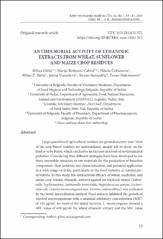Antimicrobial activity of ethanolic extracts from wheat, sunflower and maize crop residues

View/
Date
2023Author
Glišić, Milica
Bošković Cabrol, Marija
Čobanović, Nikola
Baltić, Milan Ž.
Vranešević, Jelena
Samardžić, Stevan
Maksimović, Zoran
Metadata
Show full item recordAbstract
Large quantities of agricultural residues are generated every year. Most of the crop-based residues are underutilized, mainly left to decay on the land or to be burnt, which can lead to an increase in a load of environmental pollution. Considering this, diff erent strategies have been developed to use these renewable resources as raw materials for the production of bioactive compounds, their isolation and characterization, and potential application in a wide range of fi elds, particularly in the food industry as natural pre-servatives. In this study, the antibacterial effi cacy of wheat, sunfl ower, and maize crop residue ethanolic extracts against six bacterial strains (Salmo-nella Typhimurium, Salmonella Enteritidis, Staphylococcus aureus, Escheri-chia coli, Listeria monocytogenes and Yersinia enterocolitica) was evaluated by the broth microdilution method. Used extracts inhibited the growth of selected microorganisms with a minimal inhibitory concentration (MIC) o f 320 μg/mL for most of the tested bacteria . L. monocytogenes showed a MIC value o f 640 μg/mL for wheat ethanolic extract, and the MIC value of sunfl ower ethanolic extract fo r S. Typhimurium wa s 160 μg/mL. Th ere were no minimum bactericidal concentration (MBC) values for any of the bacteria within the extract’s concentration ranges teste d (≤ 2560 μg/mL). Th e results of the present study indicate that crop residue ethanolic extracts could exhibit bacteriostatic eff ect and therefore have the potential as natural additives in food preservation.
